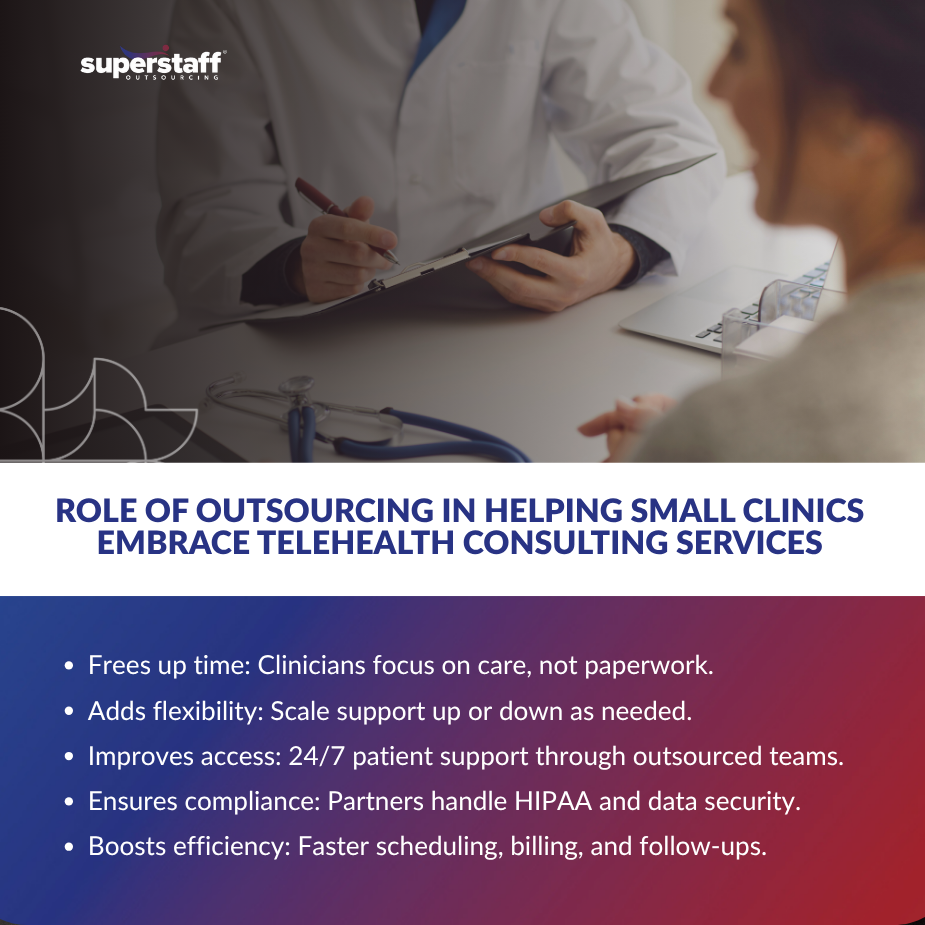
In today’s healthcare landscape, small clinics often find themselves competing against sprawling hospital networks and well-funded providers that seem to have every advantage—larger staffs, better technology, and broader geographic coverage. For many independent or community-based practices, keeping up with rising patient expectations and increasing operational demands can feel like an uphill battle.
But the rapid rise of telehealth consulting services is shifting that dynamic. What began as a necessity during the pandemic has evolved into a long-term solution that empowers smaller clinics to extend their reach, reduce overhead, and deliver care on par with major healthcare systems. Telehealth is no longer just a convenience—it’s a competitive equalizer.
This blog explores how small clinics can leverage telehealth, supported by strategic outsourcing partners, to enhance patient access, streamline administrative workflows, and improve care quality without inflating their budgets. If you’re looking to deliver top-tier healthcare while remaining financially agile, this guide is for you.
Telehealth Bridges the Accessibility Gap for Small Clinics
Small clinics often serve communities with limited access to healthcare. Geographic isolation, transportation challenges, and workforce shortages are all barriers that can keep patients from receiving timely care. Telehealth consulting services allow small practices to overcome these limitations by offering virtual consultations, diagnostics, and follow-ups that don’t require a patient to physically visit the clinic.
One of the most transformative aspects of telehealth is how it removes the need for physical proximity. Patients can connect with physicians and specialists from the comfort of their homes, which is especially beneficial for those living in rural or remote areas. This virtual reach significantly expands a clinic’s patient base without requiring additional physical infrastructure.
For underserved populations, telehealth offers a lifeline. It ensures that quality healthcare is no longer dictated by zip codes. Whether it’s a chronic condition that needs regular monitoring or a sudden illness, telehealth makes timely medical intervention possible. Clinics can now offer expanded services such as mental health counseling, follow-up care, or medication management entirely online.
What is the key benefit of telehealth? Accessibility. When clinics break free from location constraints, they improve care availability and strengthen community health outcomes.
Beyond access, telehealth also delivers significant cost savings for clinics operating on tight budgets.
Reducing Overhead Through Digital and Outsourced Support
Digital healthcare isn’t just about video calls. It’s about optimizing every step of the patient journey. When small clinics integrate telehealth solutions, they reduce reliance on costly in-house administrative processes. By outsourcing non-clinical tasks to healthcare business process outsourcing (BPO) providers, clinics can run leaner operations without sacrificing quality.
Tasks like patient intake, appointment scheduling, insurance verification, and even billing can be managed remotely by trained support teams. This approach not only lowers labor costs but also improves accuracy and speed. Rather than hiring multiple full-time administrative staff, clinics can rely on affordable healthcare staffing solutions that scale as needed.
Another major area of cost reduction comes from lower infrastructure requirements. Clinics don’t need to invest in expanded waiting rooms, front desks, or on-site staff for extended hours. Virtual care reduces foot traffic, which in turn decreases utility expenses, supplies usage, and overhead associated with physical space.
Plus, telehealth platforms often include automated features such as reminders and confirmations. These tools drastically reduce no-show rates, which can significantly impact revenue for small practices.
How telehealth helps small clinics reduce costs is simple: by replacing fixed overhead with flexible digital and outsourced alternatives that adapt to changing demand.
In addition to cost efficiency, telehealth also improves how care is delivered and coordinated.

Improving Continuity and Coordination of Care
Continuity of care is essential in achieving better health outcomes, especially for patients with chronic conditions or complex treatment plans. Telehealth consulting services enable small clinics to maintain regular, structured interactions with patients over time, leading to improved adherence and better monitoring of progress.
Digital platforms give providers real-time access to patient records, prescriptions, and lab results. With shared electronic health records (EHRs), every touchpoint becomes an opportunity to build a more connected and coherent care experience. Patients don’t have to recount their medical history every time they speak with a new provider, which leads to faster, more accurate diagnoses and treatment.
Coordination with specialists is also streamlined. A primary care provider in a small clinic can easily refer a patient to a remote specialist and schedule a teleconsultation, eliminating long wait times or logistical hurdles. Patients receive care faster, and providers collaborate more effectively.
Outsourced teams further support this continuity by handling case management, discharge planning, and post-visit follow-ups. These services are especially crucial for small clinics with limited staff. Having access to trained professionals who can manage the patient experience from end to end not only improves outcomes but also builds trust.
Such enhancements to patient care go a long way in boosting patient satisfaction and retention.
Enhancing the Patient Experience With 24/7 Support
In an always-on world, patients expect their healthcare providers to be responsive and accessible beyond traditional office hours. For small clinics with limited staff, meeting those expectations can be challenging. That’s where outsourced support services become invaluable.
With access to 24/7 nurse lines and teletriage teams, clinics can ensure that patients receive immediate guidance on urgent but non-emergency concerns. These services help alleviate pressure on the clinic during peak hours and reduce unnecessary ER visits.
Outsourcing also allows clinics to provide culturally sensitive and multilingual support, which is critical for serving diverse communities. Whether a patient needs assistance in Spanish, Tagalog, or another language, bilingual agents can deliver care that resonates and reassures.
In addition, patients benefit from personalized engagement through live chat, SMS reminders, and automated health updates. These channels increase patient involvement and satisfaction by offering real-time communication and tailored support.
These advantages help small clinics meet rising patient expectations—often at a fraction of the cost of in-house expansion.
Why Outsourcing Is the Secret to Making Telehealth Consulting Services Sustainable
While the benefits of telehealth are clear, implementing and sustaining a full-scale digital healthcare model can be overwhelming for small clinics. The technology itself requires ongoing updates, secure data handling, and compliance with healthcare regulations. Staffing for extended virtual hours adds another layer of complexity.
This is where healthcare outsourcing comes in. BPO providers offer the expertise, infrastructure, and flexibility that small clinics need to scale without breaking the bank. From virtual assistants and medical billing specialists to tech support and patient engagement teams, outsourcing opens the door to operational agility.
These providers bring compliance-ready teams trained in HIPAA, data privacy, and patient confidentiality, giving clinics peace of mind. Instead of dedicating internal resources to stay ahead of every regulatory change, clinics can rely on specialized partners who ensure processes stay current and compliant.
Most importantly, outsourcing allows clinical staff to focus on what they do best: providing care. When non-core tasks are offloaded, physicians and nurses have more time for patients, improving both job satisfaction and health outcomes.
With the right partner, small clinics can finally compete like large providers—without the bloated budgets.
The Bottom Line: Why Telehealth Consulting Services Are a Game-Changer for Small Clinics
Telehealth, supported by outsourced services, gives small clinics the tools they need to offer scalable, cost-effective, and high-quality care.
From improving access and lowering operational costs to enhancing continuity and the patient experience, the telehealth-outsourcing combo is a powerful equalizer. Clinics that embrace this model can expand their reach, boost efficiency, and deliver patient-centered care—even with limited resources.
Ready to make your clinic more competitive with telehealth and outsourced healthcare support? Let SuperStaff help you deliver smarter, patient-centric care—without the overhead.






